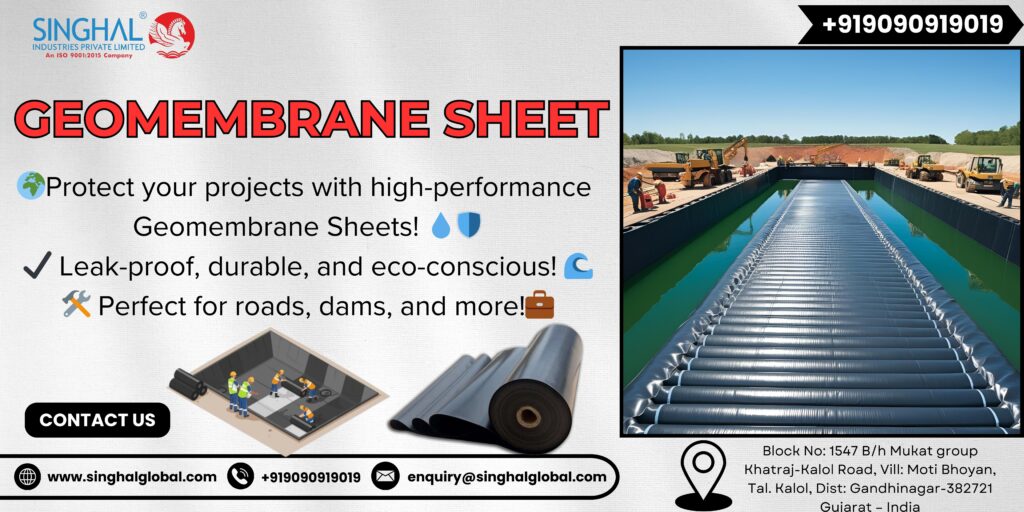Some manufacturing activities such as those that involve the use of chemicals, mining and waste disposal are some of the major threats to the quality of the soil. The risk of spills and seepage explains how it makes the land irreversibly polluted. That is where geomembranes come in handy as a solution. Since geomembranes prevent contaminants from coming into contact with the soil, they prevent heavy metals and other hazardous waste products from leaching into the ground. Owing to rising consciousness in pollution and legal requirements, the intentions of many industries are shifting towards innovative methods like HDPE geomembrane sheets.
The demand for geomembranes is growing extremely rapidly in India as various geo membrane manufacturers provide industries with tailored products for their specific requirements and applications. In cases like landfill lining, industrial lagoons or chemical storage, geomembranes have been discovered as being an efficient and effective tool to enhance the quality of soil.
The Need for Geomembranes in Industrial Environments
Some of the most common pollutants produced in industrial areas include heavy metals, solvents, acids, and hydrocarbons. If not controlled, then those pollutants may spread and infiltrate the local soil and water hence harm plant life, water sources and human health. One soil pollution can influence the environment for many years, while removal of the pollutants is usually costly and complex. To ensure direct contact with soil does not occur, geomembranes act as barriers to liquids or hazardous wastes.
This layer has today become mandatory in many facilities around the world. Currently, prominent geomembrane manufacturers are producing products that meet the needs of different industries and at the same time ensure that they are safe for the environment.
Types of Geomembranes and Their Applications
HDPE geomembrane sheet is one of the most popular units of geomembranes among all of them. It is particularly useful in chemical resistance, tensile strength, and durability. Hdpe geomembrane is also preferred where there are extreme conditions including radiation from Ultraviolet light and extreme variation in temperature as is the case with most industrial environments.
Other types of polymers are LLDPE – Linear Low-Density Polyethylene; PVC – Polyvinyl Chloride; EPDM – Ethylene Propylene Diene Monomer. Nevertheless, the overall value in the context of cost and performance puts HDPE as the most preferable option for the majority of the industrial uses.
Geomembranes are used in:
- Landfill lining systems
- Mining sites
- Oil and gas containment areas
- Industrial wastewater treatment ponds
- Secondary containment systems for storage tanks
These solutions are provided by many geomembrane manufacturer companies in India depending on the requirement of area and the type of containment required in the particular site like thickness and size of the rolls.
Advantages of Using Geomembranes
That is why there is a great popularity of using geomembranes in industrial production by providing effective protection against seepage or migration of pollutants. They are made to be totally sealed, so that dangerous substances cannot leak into the environment in particular the surrounding soil and groundwater.
To this end, significant cost saving is another major advantage as the two concepts examines shows. Even though it requires capital investment to put in place geomembranes, in the long run, it will lead to losses accrue from clean-up costs of contaminated soils, litigation costs, and penalties for non-compliance with environmental laws.
Furthermore, geomembranes improve site safety. In this way, it ensures that there are minimal chances of accidental exposure to the chemicals by workers while at the same time minimizing probabilities of workplace accidents arising from chemical explosions. This situation is quite common in facilities that handle corrosive or reactive products.
In the areas like Gujarat and Maharashtra, where there is rapid industrialization, Geo membrane manufacturers are also working to increase their capacity.
Environmental Impact and Compliance
Environmental legislation that relates to waste disposal has been coming under tightening scrutiny by governments and regulatory authorities all over the world. Concerning the hazardous waste disposal, Industrial areas have some key guidelines from the Central Pollution Control Board (CPCB). Use of Geomembranes is the most effective and efficient approach of adhering to the required standards.
Geomembranes therefore necessarily reduce soil pollution, conserve agricultural land, fauna and flora and contribute to water purification. Their usage corresponds to sustainable development objectives and promotes further development of industries.
There are also some companies which are located in India and that companies also provide services for the installation of geomembrane and when they have sold the material and then they have to send it for the testing to check for its performance in the field.
Quality Assurance and Testing
However, it features ability, greatly depend on the quality of the same geomembrane used for construction purposes. That is why leading HDPE geomembrane sheet producers apply strict quality control measures on their products. Some of the tests are tensile strength test, punctre test, elongation test, permeability test and chemical test resistance.
Furthermore, field tests done before, during and after the installation aid in ascertaining if the geomembrane has the intended application. Both leachate monitoring systems and geomembrane leak detection surveys are relatively familiar in important facilities.
When deciding on the geo membrane manufacturers to use, it is important to choose those who meet the standards such as ASTM, GRI-GM13 or ISO.
Choosing the Right Geomembrane Supplier
To attain efficient containment system, it is crucial to identify reliable supplier of geomembrane. Reputed manufacturers do not only offer superior quality products, but also assist clients on how to the products should be installed, designed and maintained.
For instance, several Geomembrane manufacturers in India are established in Ahmedabad and they provide different products for different industries. Today, the advanced manufacturing technologies allow suppliers offer geomembranes that are stronger, lighter and easier to install.
With a supplier, some of the important aspects that are important in the containment system include certification even of the products, experienced installation, adequate technical support, and customer relations.
Conclusion
Over the years, industrialization has continued to advance as well and we cannot forget the need to take care of our environment. It is in getting this balance that geomembranes are beginning to play an important role. These liners have become essential in many fields due to their capacity to minimize soil pollution, enhance safety and meet the requirements set down by the laws governing the environment. As mobile, reliable geo membrane manufactures supply industries with customized, long lasting and affordable products, industries in India are opting to use geomembranes as the way forward.
Frequently Asked Questions (FAQs)
Q.1 Is geomembrane suitable for water containment?
Yes, one of the most common applications of geomembranes and particularly the HDPE geomembrane sheets, is used in water containment systems like water ponds, canals, reservoirs and tanks. They reduce leakage and do not support growth of algae and other microbes.
Q.2 Can geomembrane be used for pond and reservoir lining?
Absolutely. The pond and reservoir lining is very well satisfied and appropriate to use geomembranes. Due to their high impermeability, water is well locked to ensure it is conserved for usage in agricultural, municipal and industrial water storage.
Q.3 How does geomembrane enhance site safety?
The use of geomembranes has benefits in that it minimizes soil and water pollution, and the likelihood of direct contact with toxic materials. This makes them useful in ensuring safety in an industrial site through containment of leaks and spills.
Q.4 How is geomembrane tested for quality?
The tensile strength test, puncture resistance test, chemical compatibility test and the permeability test are conducted on geomembranes. Quality control takes place during the manufacturing process and during the installation so as to help the system last as long as possible.









